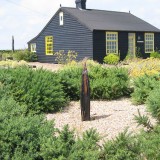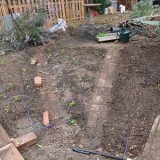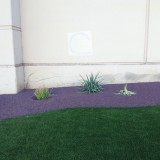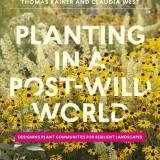
Photo of Ian Hamliton Finlay at Little Sparta by Murdo Macleod.
Recent developments in our front yard landscape that will go unmentioned led to an evening of reviewing the works of my favorite poet, gardener and artist, the late Ian Hamilton Finlay. I thought I’d intersperse excerpts from his prose poem Unconnected Sentences on Gardening with a few of my disjointed reactions,
A garden is not an object but a process.
I need this sentence tattooed on my forearm as I tend to want the garden to be “finished”. A garden is never finished, never complete, never the same. A garden is like the ever unfolding novelty of the divine logos; it’s never static; it’s always in motion. As Heraclitis says, “You cannot step twice into the same river; for other waters are continually flowing in.”
Installing is the hard toil of garden making, placing is its pleasure.
I think I’ve spent too much time in the installing and not enough time contemplating the placing. In so doing gardening has become more of a chore than a pleasure.
Superior gardens are composed of Glooms and Solitudes and not of plants and trees.
I take this to mean that a garden should express moods and ideas and not be just a collection of plants or a collection of objects set amidst plants. Finlay’s garden is a poem. While it has a lot of sculpture in it, it’s not what you would call a “sculpture garden” which Finlay speaks despairingly of as little more than an “outdoor art gallery.”
A liberal’s compost heap is his castle.
Garden centres must become the Jacobin Clubs of the new Revolution.
Certain gardens are described as retreats when they are really attacks.
Finlay’s garden became a literal battle ground for his disputes with the Scottish Arts Council and with local town council bureaucrats. At various times his art was seized by the police and he became embroiled in a tax dispute with local officials. In the early 1980s his friends, dubbed the “Saint-Just Vigilantes” after the French revolutionary leader, successfully repelled a raid by the police in an action Finlay dubbed the “First Battle of Little Sparta.” Much of Finlay’s garden serves as a memorial to this personal struggle. But Finlay’s garden (dubbed “Little Sparta” after the conflict) also serves as a broader metaphor for every garden as an act of resistance against injustice, war and the destruction of the natural world.

The murmur of innumerable bills was known to most great gardeners.
No kidding. As Kelly and I ponder the reworking of our front yard (yet again–see garden as process above), I too am pondering a new set of bills. Finlay being a poet could also be punning on the word “bill”. Perhaps he also means “bill” as in laws, taxes and zoning regulations. Either way there’s always an unsettling worldly threat looming outside the peace of the garden. As Poussin’s enigmatic painting Et in Arcadio Ego hints at, even in paradise death, destruction, credit card bills, tax collectors and building inspectors intrude.
To see more of Finlays’ work visit the Little Sparta Trust website.





forgive my ignorance, but are those supposed to look like hand grenades?
Yes–Finlay used weapons and war imagery in his art and poetry. The gate, like all good art, can be understood in different ways. In one way his garden is a kind of “nature hand grenade” — and attack on a culture that denies and destroys the natural world. In another way the gate is a kind of reflection of Finlay’s inner state. Here’s what James Campbell says in the Guardian,